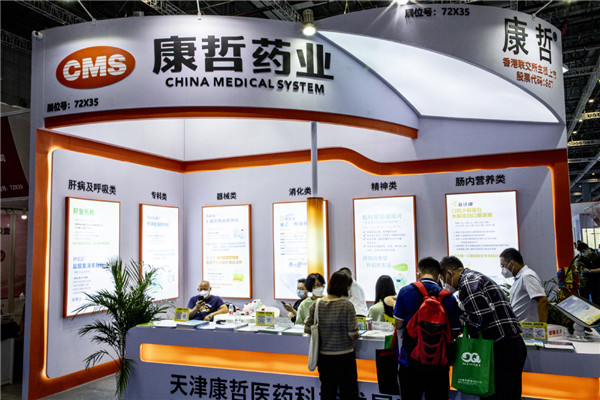Pharma firms eye Singapore for bigger global footprint


Visitors gather at the CMS booth during a medical exhibition in Shanghai. The company announced the acquisition of a factory in Singapore in December to expand its global footprint. CHINA DAILY
City state boasts advanced medical resources, efficient management
With improved innovative capabilities, competitiveness and international initiatives, Chinese pharmaceutical firms are expanding business in Singapore to tap into a new "battlefield".
In late December, China Medical System, a Shenzhen, Guangdong province-based biopharmaceutical company, announced the acquisition of a factory in Singapore through wholly owned subsidiary CMS Medical Venture Pte Ltd and non-wholly owned units Rxilient Health and PharmaGend Global Medical Services Pte Ltd. The factory, which is located in Tuas Biomedical Park in Singapore and occupies 60,000 square meters, is expected to support CMS' contract development and manufacturing organization (CDMO) business in Southeast Asia.
"With Chinese innovative pharmaceutical companies deepening their globalization drive, exploring a 'second battlefield' in Singapore has become a must. With its role as a hub for the intersection of East and West, as well as its geographical advantage of being part of the Southeast Asian market, Singapore provides ideal industrial and international support for Chinese pharmaceutical companies going abroad to Southeast Asia," said Zhang Jue, a pharmaceutical expert at VBData.cn, a Chongqing-based healthcare service platform.
Specifically, Zhang said Singapore owns advanced medical resources, efficient management, abundant talent resources, a comprehensive medical product administration system, a developed infrastructure and an efficient logistics system. Several high-quality biopharmaceuticals are manufactured in Singapore, and more than 15 renowned multinational drugmakers have established factories in the city state.
Meanwhile, other Chinese pharmaceutical companies have also been accelerating their commercialization process in Singapore over the past year. In March, Shanghai Junshi Biosciences Co Ltd announced collaboration with Singapore-based Rxilient Biotech on development and commercialization of an antibody drug through a joint venture in nine Southeast Asian nations — Thailand, Brunei, Cambodia, Indonesia, Laos, Malaysia, Myanmar, the Philippines and Vietnam.
Li Ning, CEO of Junshi Biosciences, said, "Southeast Asia boasts a thriving pharmaceutical innovation environment, flexible drug regulatory policies and diversified medical security systems, so it has great potential as an emerging market for innovative drugs."
The company said it is planning to launch the antibody drug in more markets. At the end of last year, the product was approved by the United States Food and Drug Administration. Many regulatory authorities in Southeast Asia rely on the FDA results, and the application process is more about completing the registration process.
"In addition, obtaining high-quality endorsements from the FDA will also greatly assist in accelerating the approval of more indications of the product, especially in Southeast Asian countries where companies can accept applications for indications already listed in China," Li said.
"With rapid economic development and the rise of the emerging middle class in Southeast Asia, the region will play a role as a new engine of growth for the global pharmaceutical and biotechnical market in the future," said Lee Ker Yin, CEO of Rxilient.
"From Rxilient to PharmaGend, a closed loop for Chinese pharmaceutical companies' 'new globalization' path is gradually formed — new domestic drugs are produced using Singapore as a development platform and sold on the global market," Zhang said.
Market consultancy CPhI Insight expects that by 2025, pharmaceutical sales revenue in Southeast Asia will surpass $44.4 billion. So far, an increasing number of pharmaceutical companies from home and abroad have flocked to Southeast Asia to establish factories, distribution channels and marketing networks.
Hong Yong, an associate research fellow at the e-commerce research institute of the Ministry of Commerce, said: "The fact that Chinese pharmaceutical companies are expanding business to not only developing countries in Southeast Asia, but also Singapore, demonstrates that their innovative capabilities, competitiveness and international strategies have been improved. As an important hub of both global pharmaceutical research and development and production, Singapore presents higher requirements for drug enterprises' R&D capability, product quality and international compliance. Successfully entering and gaining a foothold in Singapore shows that they have made great progress in supply chain management, quality control and adapting to the global market."
For further development in Singapore, Hong suggested that Chinese companies strictly follow local laws and regulations, enhance intellectual property protections, and pay attention to localized operations in order to achieve long-term development.







